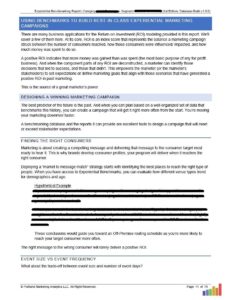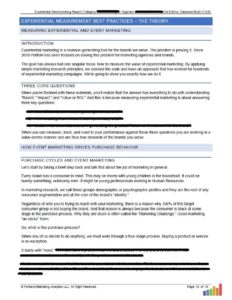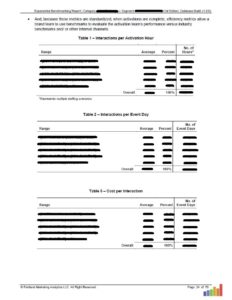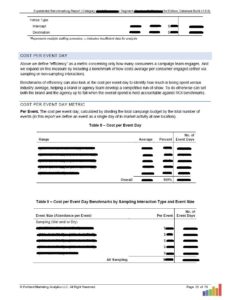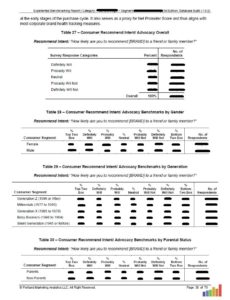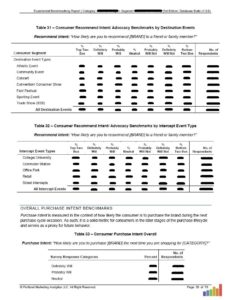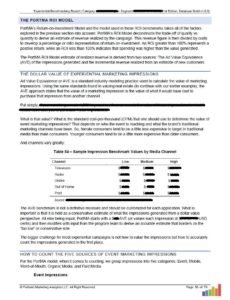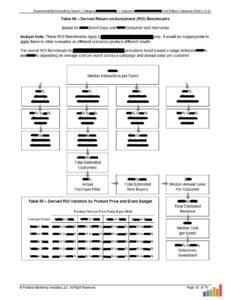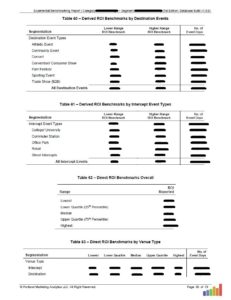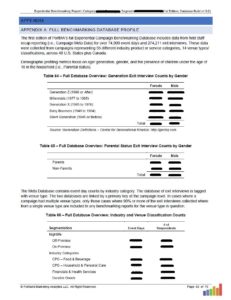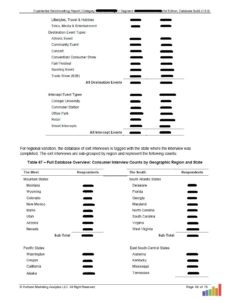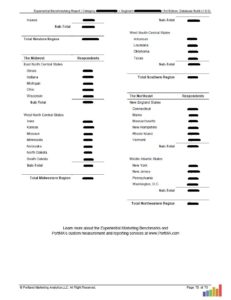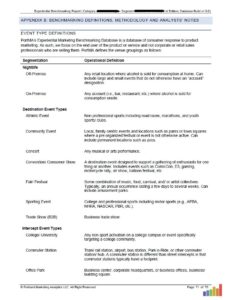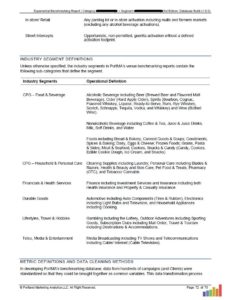The data in this report are derived from 94,066 consumer exit interviews conducted at 1,947 sponsorship events held at destination venues (e.g., Concerts, Fair/ Festivals, Sporting Events, etc.). The data from these onsite consumer interviews were combined with field staff recap data to form the basis for the data used in this report.
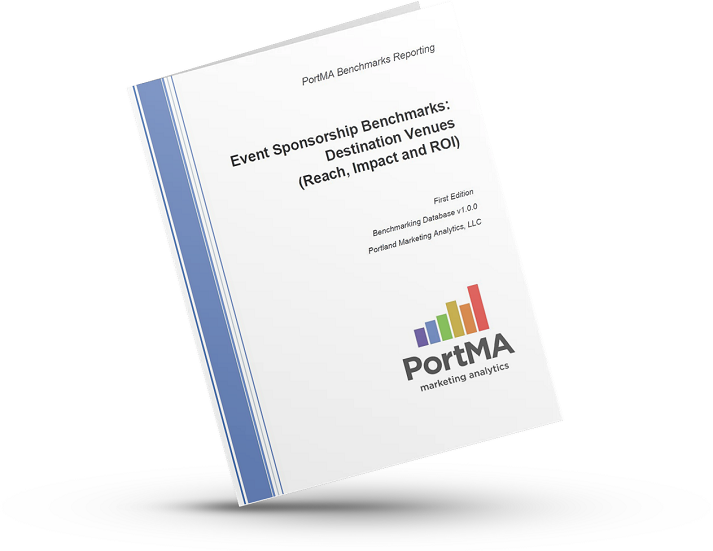
Event Sponsorship Benchmarks: Destination Venues Report
1st Edition | Region: United States
1,947 Event Days | 94,066 Consumer Interviews
Executive Summary (1 Page), Full Report (75 Pages), PowerPoint (73 Slides)
$395 – Single User License (PDFs, PowerPoint, & Analyst Support)
Destination Events Defined: PortMA’s Destination Events venue/ event type classification includes Athletic Events, Community Events, Concerts, Convention/ Consumer Shows, Fairs/ Festivals, Sporting Events, and B2B Trade Shows. This designation contrasts Intercept Venues, which defines locations where consumers work and live (versus Destination Venues, where consumers go to “play”).
- Event Days: 1,947 Sponsorship Event Days at Destination Venues
- Consumer Interviews: A Total of 94,066 Post-Sponsorship Engagement Consumer Interviews
- Interactions: 4,427,791 Total Event Sponsorship Consumer Interactions at Destination Venues
- Samples: 2,639,978 Samples Distributed
- Campaign Budgets: Over $23,348,822 in Event Sponsorship Marketing Spent at Destination Venues
- Attendance: Estimated 92,344,410 Event Sponsorship Destination Venue Attendance
At the time of this publication, PortMA’s Experiential Benchmarking database (across all industry segments) contains over $87.4 million (USD) spent on experiential brand marketing across 74,990 event days and 17,706,070 consumer interactions.

Applying This Report to Your Business
See how great Experiential Marketers measure the ROI of their events with these use case videos. Access the brief video suite below by submitting your email address.
In these videos, we use actual data from experiential campaigns to describe the status update and recapping techniques used by leading agencies and brands.
Business Use Case Scenarios
Applying This Report to your Business
Use case scenarios (and how to apply them to your business) are detailed in each report. Below are some of the common applications of experiential ROI benchmarks:
-
- Designing a Winning Marketing Campaign
- Selling Your Experiential Campaign to Stakeholders
- Negotiate Better Venue and Sponsorship Agreements
- Validating a Proposal’s Performance Promise and Budget
- Managing Campaign Performance
Use Case Details
- Designing a Winning Marketing Campaign
The best predictor of the future is the past. And when you can plan based on a well-organized set of data that benchmarks this history, you can create a campaign that will get it right more often from the start. You’re moving your marketing downriver faster because you can use benchmarks to identify the venues with your consumer target and strike a stronger balance between “event size” and “event frequency.” - Selling Your Experiential Campaign to Stakeholders
We’re all always selling. It doesn’t matter if you’re a Brand Manager talking to your VP or an Agency Director talking to your Brand Client. You need to demonstrate that your reasoning is sound and your plan is positioned to be a success. Experiential marketing benchmarks allow you to differentiate yourself from the external and internal competition and demonstrate the value before spending money. - Negotiate Better Venue and Sponsorship Agreements
When speaking with venue managers or developing sponsorship agreements, the right benchmarks will give you a reference point. You’ll be in a stronger negotiating position with data on your side because you can validate venue manager and producer performance commitments and choose the best sponsorship package. - Validating a Proposal’s Performance Promise and Budget
A solid benchmarking resource will allow you to validate an outside agency or vendor’s plan. We recommend that you consult the right benchmarking tables in your report anytime you evaluate an experiential activation strategy, validate agency performance commitments, and evaluate a campaign’s budget before committing. - Managing Campaign Performance
When you have performance benchmarks from dozens of experiential programs, you know what to expect. Properly using and applying experiential benchmarks will allow you to establish the right Key Performance Indicators (KPIs) to evaluate campaign performance during execution and recap your program when it is complete.
Report Package Details
What do I receive when I purchase a report?
Each report purchase includes three documents and support from our research team to ensure you get the solution you need.
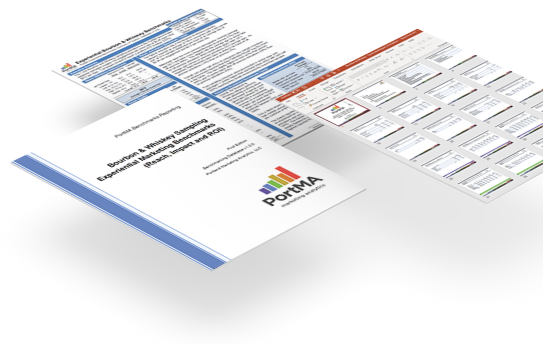
- Experiential Marketing Benchmarks Report (Fully Indexed PDF)
First, you’ll receive a comprehensive PDF with a full background on the data collection methodology and the related experiential marketing strategy. This includes the data points collected, how, and why. This background provides a full outline of PortMA’s proprietary return-on-investment model. The report benchmarks define the reach, impact, and ROI trends across the industry and multiple venue types. These metrics are detailed in tables within this broader context of theory and application. - Data Tables Deck (PowerPoint Document)
Second, we summarize the experiential marketing strategy and related data with the data tables in a PowerPoint document on individual slides. This document is provided to pick and choose the most relevant slides for individual efforts. These slides can be repurposed in your Client recap reports, RFP responses, and individual presentations. - A 1-Page Executive Summary (PDF)
Third, a top-line summary of the experiential marketing report is presented in a one-page executive summary using PortMA’s proprietary “Scorecard Reporting” methodology. This document serves as a quick reference on the key data points and industry ROI segments. The report is designed for easy reading and distribution to internal management. It also serves as a quick reference guide.

A seasoned Experiential Marketing Analyst will be assigned to your account for on-call support by email or phone.
You are encouraged to call on your Account Manager for any of the following. You are provided one hour of on-call support for the 12 months following your purchase. Additional time can be purchased if/ as needed.
- One-on-One or Team Training
- Sales Support/ RFP Response Assistance
- Survey/ Data Collection Architecture Design
- Data Dashboard Consulting/ Wire Frame Development
- Data Analysis Assistance or Completion
- Report Development Assistance or Completion
- Client Briefing Preparation, Attendance, or Meeting Leadership
Your account manager would be happy to provide you with any ad-hoc analyses you might need based on the raw data behind the report you purchased.

